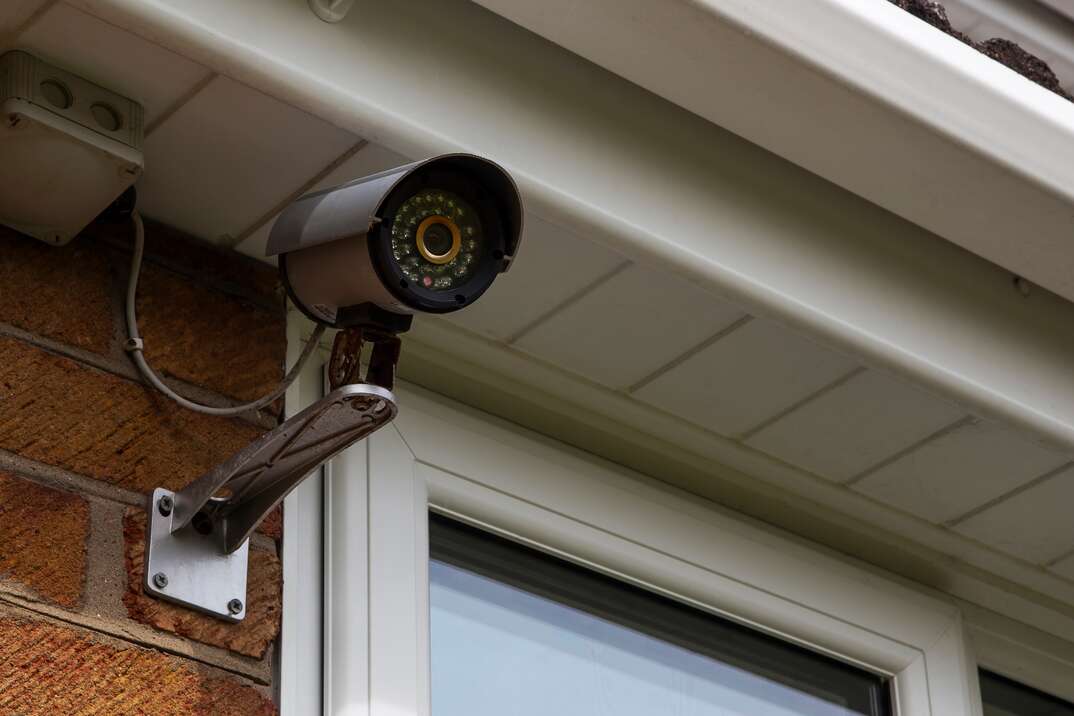- AppliancesElectriciansHVACLandscapingLocksmithPest ControlPlumbingRenovationRoofingT V RepairAll Home Improvement
- Car AccidentClass ActionCorporate LawCriminal DefenseDivorce LawEmployment LawFamily LawFinancial LawLegal AidMedical Injury LawyersMedical MalpracticeReal Estate LawWater Fire RestorationAll Legal
- InvestmentRetirementAll Finance
- Animal InsuranceAutoGeneral InsuranceHealth PolicyHome RentersAll Insurance
- DentalHealth SpecialistsAll Medical
- Animal CareVeterinaryAll Pets
- Auto GlassTowingAll Automotive
What to Know About Security Camera Laws

Reviewed by Carina Jenkins, J.D.
Surveillance cameras are becoming increasingly common, raising concerns about their impact on personal privacy.
This article explores the legalities surrounding their installation and usage and offers guidance on addressing potential infringements, including dealing with nosy neighbors and reporting illegal surveillance.
Generally, it’s legal to install surveillance cameras on your property, but there are some exceptions. Recording individuals in a public place, such as a sidewalk, is generally permissible under the First Amendment as long as it’s not for illegal purposes. However, recording individuals in a private area, such as their backyard, might be an invasion of their privacy.
You must obtain consent from individuals if your surveillance cameras could record them on their property. The concept of a "reasonable expectation of privacy" also plays a role. In general, individuals have a reasonable expectation of privacy in their homes and curtilage (the area immediately surrounding their homes).
Do You Need Permission to Put up a Security Camera?
Generally, homeowners don’t need permission to install security cameras on their homes, as long as the cameras don’t record areas where people have a reasonable expectation of privacy.
Some states have laws that specifically address the use of security cameras in common areas of condominiums and apartment buildings. These laws may require homeowners to obtain the permission of their neighbors or the homeowners association.
It’s generally not illegal to have cameras inside your house. In most states, you only need one person's consent to record audio or video. This means you can record yourself or anyone else in your house without their permission.
You can't record someone in a bathroom or bedroom without their permission, even if they're in your house. These are considered private areas where people have a reasonable expectation of privacy. However, exceptions exist, such as installing a nanny cam if you have legitimate concerns.
More Related Articles:
- When Do You Need a Lawyer? Determine If You Need to Hire an Attorney
- What Is a Class-Action Lawsuit?
- What Is a Misdemeanor?
- What to Do After a Car Accident
- What Is Power of Attorney?
Is Recording Audio on a Security Camera Illegal?
The legality of recording audio on security cameras in your home depends on the state you live in. In some, such as California (known as "two-party consent" states), it’s illegal to record the audio of someone without their consent, including in your home. In others, such as Texas (known as "one-party consent" states), you only need the consent of one person to record audio or video, including in your home.
However, it’s not okay to record someone in a bathroom or bedroom without their consent, even if you live in a one-party consent state.
What Can I Do If My Neighbor Is Recording Me?
If you suspect your neighbor is recording you without your consent, you should take steps to safeguard your privacy and seek appropriate action. Your first step should be to ask them politely to stop. If that fails, here’s what to do.
1. Gather evidence: Collect evidence that supports your claim. This might include recording the neighbor's activities yourself and photographing their surveillance equipment.
2. Assess legality: Determine whether your neighbor's recording practices are legal in your state.
3. Seek mediation: If your neighbor is uncooperative, consider seeking mediation. A professional mediator may be able to help both of you reach a mutually agreeable solution. However, you probably can't force an unwilling neighbor to participate in mediation.
4. Consider legal action: If your neighbor continues their behavior, you may need to take legal action. Consult with an attorney to discuss your options.
You may wish to contact the police if you have serious safety concerns — for example, if you believe someone has a camera pointed into your child's bedroom.
Remember, it's crucial to document your interactions with your neighbor and any evidence you gather. Maintaining a record of your concerns and efforts to resolve the issue will strengthen your case if you need to pursue legal action.
How to Report Illegal Surveillance
After you’ve gathered evidence and identified the jurisdiction, which could be your home state, the state where the surveillance equipment is located or the state where the data is being collected or stored, you can contact the appropriate authorities. This could include the police, the Federal Trade Commission (FTC) or the Department of Justice (DOJ).
You can also contact these privacy rights organizations for assistance:
- Electronic Frontier Foundation (EFF): The EFF defends digital privacy and free speech.
- American Civil Liberties Union (ACLU): The ACLU defends individual liberties and civil rights.
- National Lawyers Guild (NLG): The NLG provides legal representation to people who are fighting for social justice and civil rights.
Elocal Editorial Content is for educational and entertainment purposes only. The information provided on this site is not legal advice, and no attorney-client or confidential relationship is formed by use of the Editorial Content. We are not a law firm or a substitute for an attorney or law firm. We cannot provide advice, explanation, opinion, or recommendation about possible legal rights, remedies, defenses, options or strategies. The opinions, beliefs and viewpoints expressed by the eLocal Editorial Team and other third-party content providers do not necessarily reflect the opinions, beliefs and viewpoints of eLocal or its affiliate companies. Use of the Blog is subject to the
Website Terms and Conditions.The eLocal Editorial Team operates independently of eLocal USA's marketing and sales decisions.



